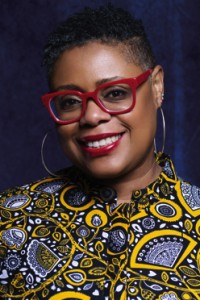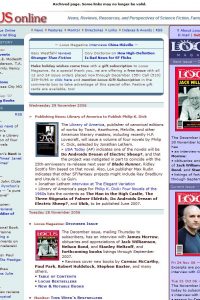Vajra Chandrasekera: The Mythic and the Modern

VAJRA CHANDRASEKERA was born in Colombo, Sri Lanka, where he still lives. He began publishing short fiction with ‘‘Pockets Full of Stones’’ in Clarkesworld (2013), and has since published scores of stories in genre magazines and anthologies. ‘‘The Translator, at Low Tide’’ (2020) was a finalist for the Theodore Sturgeon Memorial Prize.
Debut novel The Saint of Bright Doors (2023) won Crawford, Ignyte, Locus, and Nebula Awards, and was a finalist for Dragon, Hugo, and Lammy Awards, as well as the Ursula K. Le Guin Prize. His latest novel, Rakesfall, was published earlier this year.
Chandrasekera was a finalist for the Sydney J. Bounds Award for Best Newcomer in 2024. He is also a published poet, essayist, and reviewer. He has worked as an editor for Strange Horizons, and edited anthology Afterlives: The Year’s Best Death Fiction 2023 (2024). He also served as a judge for the Dream Foundry contest and the Salam Award.
Excerpt from the interview:
“I enjoy writing. I know not all writers do, but I very much enjoy the act of writing. Most people who ask what kind of books I write are not conversant with the highly contested genre boundary arguments. They’re people outside that fandom space, looking for a simple answer like fantasy or sci-fi – full stop. Or fantasy and sci-fi; it’s all the same to a lot of readers. What they mean is, ‘Is it genre or is it literary?’ For that, I have a straightforward answer: Tor marketed The Saint of Bright Doors as a fantasy novel and Rakesfall as a sci-fi novel, which, to my view, is entirely arbitrary. They could have gone the other way just as easily. It’s a question of how they thought each book would best be shelved in bookstores.
“In terms of an abstract literary category, I think of myself in the tradition of the New Wave, the New Weird, and slipstream. All of that, to me, is one tradition – the tendency away from the Tolkienesque or the hard sci-fi molds toward something more contemporary and more socially concerned. That’s the kind of thing I’m trying to write, but there isn’t a good single name for it, because it’s been called different things by different people over the decades. I’m sure people would disagree with the idea that all of these things are really the same thing. But, very broadly speaking, there is a tendency to look at the words on the page, and then there’s a tendency to look at the world off the page, and I think of these as two big schools of how to think about the fantastic in literature and speculative fiction. I lean very heavily to looking at the words on the page.
“Ironically, I was asked about science fantasy recently, in a roundup at Five Books. I don’t know if they gave me that category because they thought my books were science fantasy, but I ran with it, because they gave me the phrase. I do like science fantasy as a concept, and it’s having something of a comeback. Especially in the aftermath of Tamsyn Muir’s Locked Tomb books, which have put the phrase ‘science fantasy’ back into readerly usage, when I hadn’t seen it in a long time. If you look back to 20th-century antecedents of that phrase, Gene Wolfe is the one that everyone is going to mention. People bring up The Book of the New Sun to me all the time, which is very flattering, and also a little confusing, because I have been asked if I made deliberate references here and there to those books – which I did not. I may have made unconscious references, I suppose.
“I think science fantasy is a good way of describing my work because, if nothing else, it’s about straddling the boundary and making it a problem, and that is clearly the situation I find myself in. It’s hard to tell what kind of subgenre my books are, specifically because they have different parts that can be read in different ways, and different people take very different readings of them. I think science fantasy is a good phrase for it– I would be happy with that description. It’s a term with a grand old history in its own way, with Clark Ashton Smith and so on. I prefer ‘science fantasy’ to ‘speculative fiction,’ purely because it sounds pulpier. ‘Speculative fiction’ sounds very respectable, and the academy is very much engaged in trying to claim it and theorize about it and have seminars about it. I like the pulpy sound of science fantasy – it sounds like something fun is happening.
“I had one trunk novel that I wrote in 2005. It was really, really bad, and I wrote it for National Novel Writing Month. That was back when NaNoWriMo was not embracing AI, long before they got canceled – and deservedly canceled, I might add. That was the only complete trunk novel that I have. I’ve had a bunch of others in various stages of completion over the years, but I struggled to adjust my style, which was a very short fiction-focused style. If you look at all my short stories, a great many of them are under two thousand words – the shortest range of short fiction. I was developing a style for the longest time, but I couldn’t translate it into novels. None of the novel projects I tried in that ten-year period, when I was actively publishing short fiction, ever actually went anywhere. In a lot of ways, The Saint of Bright Doors actually is my first proper novel – the first one that I thought I could sell.
“I sold a story to Apex fairly early on, but it didn’t appear until 2013. There was a 13- or 14-month gap between acceptance and publication. My first actual genre publication was in Clarkesworld, which happened earlier in 2013; I wrote the story, sold it, and it appeared, all before the Apex story actually came out. The first sale and the first publication are two separate things. I met Neil Clarke at Readercon and I told him he published my first short story, and he was like, ‘Oh, I didn’t realize that was your first!’
“I don’t outline. Or, I guess, I do kind of outline, but not in detail. I’ve tried everything, basically, over this 15-year span. I’ve tried a great many techniques that didn’t work. Ultimately, what worked for me – and this is based on the three finished manuscripts I have – seems to be something like: Write the first ten or 15 thousand words exploratorily, and that span is when I figure out my ending and my key plot points. That’s about the extent of my ‘outlining.’ Then, I just write. For the most part, I like to figure out the details as I’m writing, because I enjoy following the thread of the story from paragraph to paragraph. I write very linearly. I start at the beginning, and I write till the end. I don’t jump around, and I don’t write bits in the middle.
“The Saint of Bright Doors is about Fetter, a chosen one who is not chosen. He meets a lot of people who are in that same situation –- who were unchosen, or almost chosen and then abandoned. I did that because there’s a very Third World sensibility that I have, which I tried to put in the book, where you’re conscious that there’s a lot more going on in the world. We grew up watching disaster movies or alien invasion movies or whatever, and the alien ship was always above London or New York – they were never above Colombo. Part of the impression you get from that is that, whatever is going on here, there’s always stuff going on elsewhere as well. There are always other stories that are intersecting with yours – and that’s the kind of perspective I wanted Fetter to have in The Saint of Bright Doors.
“Fetter is visibly not the only person going through some kind of crisis/adventure/quest-type story arc in the book. He meets and interacts with people who are clearly on their own paths, and their stories are just as significant as his. He’s not the center of their story, but he does play some small, glancing part in their stories, the same way that those people have a part to play in Fetter’s story. From a craft or technique perspective, I also was using that idea to give the story a sense of depth, because I feel like this is how we encounter the real world: The real world is very, very big. There’s a lot going on, and it’s impossible to keep up with everything that is going on in the world. As modern humans who are plugged in to the idiot box and the small demon machine, we are very aware of how much information there is, how much is going on in the world right now, how much of it is absolutely terrible, and how difficult it is to keep up with what is going on, much less be able to gain a clear, unambiguous understanding – to gain certainty about any of it.
“A hazard of the way that fantasy is often written is that you have these stories that make grand claims about the world: The world was made in this way, there are specific magics in the world, and so forth. These are definitive answers in ways that feel very alien to me – I think to most people, really, but we’re trained by the genre not to find that certainty as alienating as we should. Uncertainty makes for a richer world, as a reading experience, and it also makes for a more relatable kind of protagonist. I find it very hard to relate to the kind of people who are absolutely sure, not only of what is right and wrong, but about what their options even are, because that is not anything like what it’s like to be a person in the world.
Interview design by Francesca Myman
Read the full interview in the December 2024 issue of Locus.
 While you are here, please take a moment to support Locus with a one-time or recurring donation. We rely on reader donations to keep the magazine and site going, and would like to keep the site paywall free, but WE NEED YOUR FINANCIAL SUPPORT to continue quality coverage of the science fiction and fantasy field.
While you are here, please take a moment to support Locus with a one-time or recurring donation. We rely on reader donations to keep the magazine and site going, and would like to keep the site paywall free, but WE NEED YOUR FINANCIAL SUPPORT to continue quality coverage of the science fiction and fantasy field.
©Locus Magazine. Copyrighted material may not be republished without permission of LSFF.







